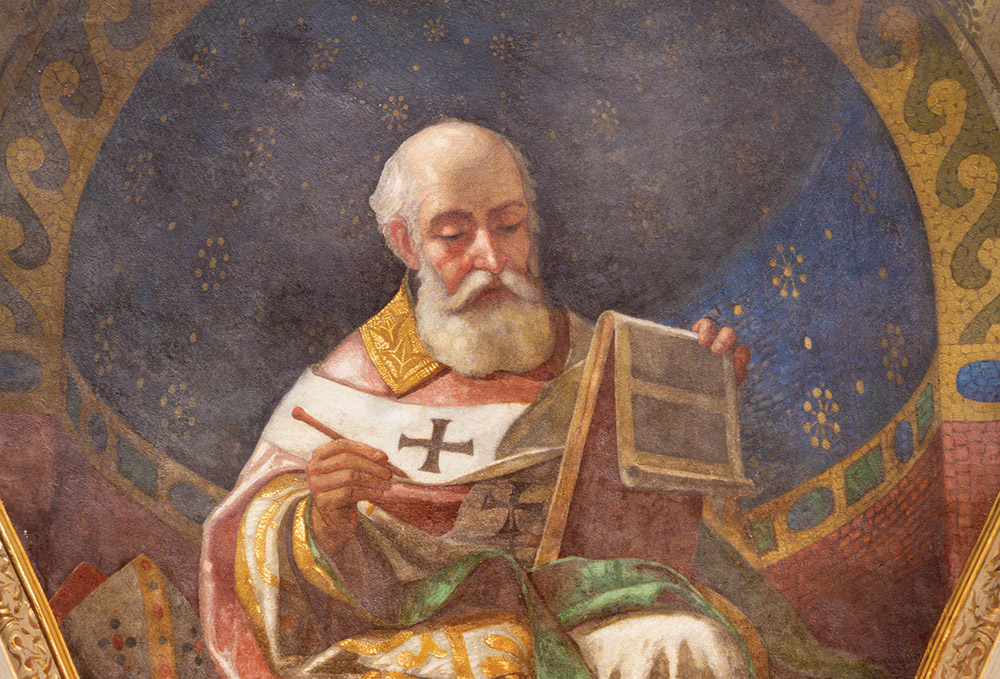‘God is always trying to give good things to us, but our hands are too full to receive them.’
“You have made us for yourself, O Lord, and our heart is restless until it rests in you.”
St. Augustine (354-430) searched his entire life for love and truth, making his story universally appealing for all those who follow Christ. In his autobiography “Confessions,” he details his battle against sin and his struggle toward a life of virtue in God’s grace.
Born in northern Africa in 354, Augustine quickly advanced in a promising career as a teacher of rhetoric and philosophy. Even as he was attaining his goals, his life was not fulfilled. His pursuit of truth left him feeling empty inside.
Augustine’s mother, St. Monica, was a Christian. He did not come to faith in the Gospel, however, until much later in life, in no small part because of his mother’s determination and prayers. His conversion came after decades of searching for what he could only find in God. This included time spent with the heretical Manichaean sect and fathering a child out of wedlock. He eventually came to understand that our true satisfaction would be in a life with God. As he wrote, “You have made us for yourself, O Lord, and our heart is restless until it rests in you.”
Augustine models what conversion looks like: gradually turning toward the Lord and moving ever closer to him, never turning back. Adopting the Christian faith meant an end to his career and the comforts to which he had become accustomed. He was baptized in Milan by Ambrose at the Easter Vigil in 387.
Augustine’s story is an illustration of hope for all those who might have been, as the song goes, “looking for love in all the wrong places.” It reminds us that we will be discontented with anything that keeps us from God’s love, peace and truth. Augustine helps us recognize that our provident and all-loving God is active and alive in our lives and the world.
Before he turned 40, Augustine’s mother and son had died. Returning to his hometown, Augustine sold all he had and gave his money to the poor. He kept the family home, however, and founded a religious community for men there. Eventually ordained a priest, Augustine put to good use his skills in teaching and rhetoric and became an effective and admired preacher. Many of his sermons survive as some of the most treasured of his writings. Augustine later was ordained a bishop at Hippo, near his home in northern Africa.
Augustine is best known for his voluminous writings, which have stood the test of time and remain among the most-cited by theologians and philosophers in the West.
Toward the end of his life, the Roman Empire was disintegrating after the sacking of Rome by the Visigoths in 410. Many tried to blame Christians for its collapse. Augustine responded with writing “The City of God,” a masterpiece in which he consoled his people with the knowledge that God’s reign would triumph. He insisted that Christians should be more concerned with building up God’s kingdom rather than earthly politics. In this work, Augustine examined many of the issues facing society at the time through a theological lens, addressing the battle of good and evil, the problem of suffering, free will and original sin.
Augustine died in Hippo — located in modern-day Algeria — in 430. After his death, the city was destroyed by fire, except for his residence, which held his voluminous written works.
St. Augustine’s sanctity had been ratified by acclaim of the people in the time before formal canonizations. In 1298, he was recognized as a Doctor of the Church by Pope Boniface VIII — one of the original four so distinguished — along with St. Ambrose, St. Jerome and St. Gregory the Great. His feast is Aug. 28.
Michael R. Heinlein is editor of Simply Catholic. Follow him on Twitter @HeinleinMichael. This article is taken from the ‘Saints in Times of Crisis’ booklet from Our Sunday Visitor.

